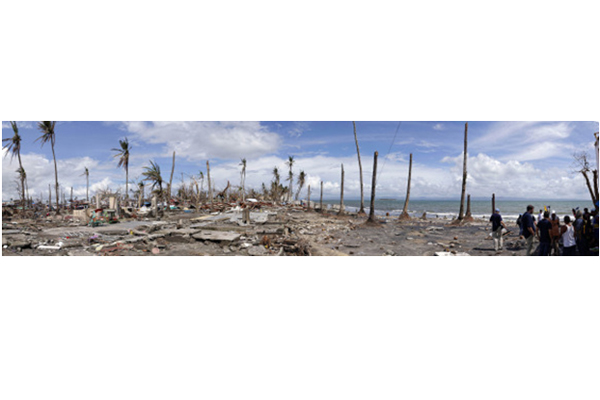|
Emergencies Should Be No Barrier To Decent Work

Carlos Carrion Crespo, ILO Public service sector specialist
In November 2013, I had the opportunity to visit Manila on ILO work. Little did I know that my trip would overlap with the arrival of super typhoon Yolanda, called Haiyan outside the Philippines. The typhoon packed sustained winds of up to 380 km per hour, killing 6,300 and leaving 22,000 people missing while devastating the landscape.
I stayed in Manila afterwards to help with the ILO’s activities to support the Philippine government and witnessed the immediate collapse of local government services, including the essential water transport needed to deliver relief goods to those affected on the island of Leyte. I could see that public emergency services were in dire need of support and was happy to represent the ILO in the UN-Philippine clusters on health and water.
Four years later, I witnessed from a distance the impact of back-to-back Hurricanes Irma and Maria on my native island of Puerto Rico with winds of up to 280 km per hour. The official death toll of 64 was much smaller than the one in the Philippines. But the collapse of the electric system took down most of the water supply with it together with sanitary and health facilities, and the quality of life of my family, friends and neighbours. New estimates that include the impact of the aftermath of the storm put the number of deaths in the thousands several hundred times the original estimate.
As a public services specialist, these disasters showed me not only how important efficient public emergency services are but also how dependent they are on the overall architecture relating to prevention, preparedness and response. Also, they taught me that public-emergency services are not limited to police, fire fighters and emergency health services but also include local government, utilities and myriad other services. Just as importantly, I learnt that coordination among government and UN agencies, while respecting national sovereignty, is crucial for any efforts to reduce the risk to life and health and to provide access to essential services to the population.
But all of these services need to be carried out by staff who are prepared, well-trained and who operate in conditions of decent work. For that reason, a Meeting of Experts met at the ILO in Geneva in April 2018 to adopt new Guidelines on Decent Work in Public Emergency Services. Experts from worker and employer organizations and from 24 governments attended. The Guidelines, which can be applied to all sorts of emergencies and disasters, contain proposals for action to provide employment security, workplace safety and health guarantees and social protection to public emergency workers, including volunteer workers, so they can dedicate all their energies to protect communities against the effects of disasters. They also provide recommendations for social dialogue, training and interagency coordination so public servants can share their knowledge, have a voice in their work environment and be fully prepared to confront the growing threat of disasters, epidemics, climate change and violent attacks that affect populations.
Workers under the employment activities of the ILO in Haiyan-affected areas were provided with protective equipment to ensure their safety. They were also given the guarantee of minimum wage, social security, health and accident insurance coverage. @Marcel Crozet/ILO
We hope that these Guidelines will contribute to the growing discussion on how to reduce the risks of loss of life, safety and health from disasters, and to promote the achievement of the Sustainable Development Goals, especially Target 1.5 to “build the resilience of the poor and those in vulnerable situations and reduce their exposure and vulnerability to climate-related extreme events and other economic, social and environmental shocks and disasters”. Governments and emergency-service providers, as well as unions who represent public emergency-service workers, can consult these Guidelines when preparing for and responding to disasters and emergencies with a workforce that is properly trained and equipped and which has participated fully in developing these programmes.
|




